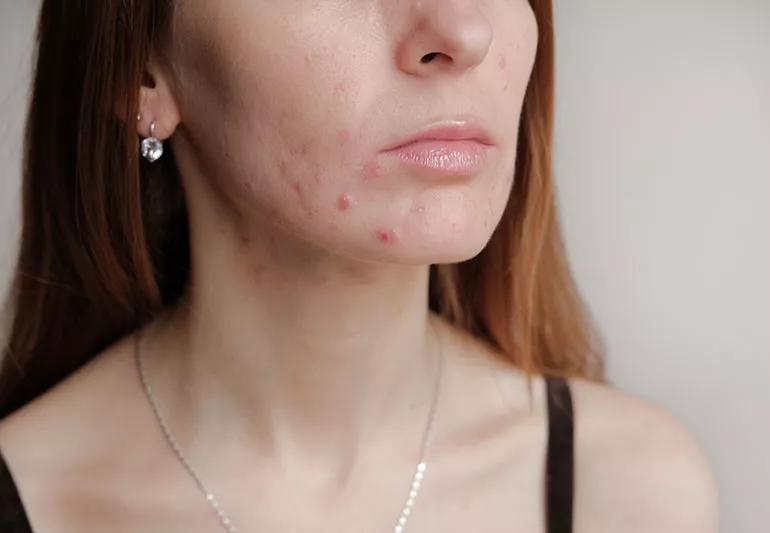An expert weighs in

Image content: This image is available to view online.
View image online (https://assets.clevelandclinic.org/transform/7170bbef-c4fd-4967-96a7-bbd573da8ab8/AcneThyroid-1167910623-770x533-1_jpg)
Closeup of jawline with inflamed, red acne
A quick look in the mirror reveals another acne breakout. You’re over 25, so what gives? There are a number of things that might be the culprit, but you wonder: Could a thyroid problem be to blame?
Advertisement
Cleveland Clinic is a non-profit academic medical center. Advertising on our site helps support our mission. We do not endorse non-Cleveland Clinic products or services. Policy
“Acne vulgaris is the medical term for chronic inflammation of the hair follicles in your skin. Dead skin cells, oil and bacteria block the follicles,” says endocrinologist Alexandra Mikhael, MD. “While there are many reasons acne develops, the leading cause of post-adolescent acne is hormone imbalance.”
Because the thyroid is your body’s hormone team captain, many have made the connection between the thyroid and acne. Dr. Mikhael examines whether it’s fact or fiction.
Located at the base of your neck, the thyroid is a small butterfly-shaped gland with a big role. It’s responsible for secreting the hormones that control your metabolism, which is how your body uses energy. And it also regulates skin function, such as how much oxygen the skin absorbs.
“The skin is one of the first organs where thyroid hormone imbalances start to show. That’s why dermatologists often suspect thyroid disorders when people have certain skin conditions, such as alopecia and vitiligo,” notes Dr. Mikhael. Alopecia is when your hair falls off in patches. Vitiligo is when you lose pigment cells, so your skin can look discolored in places.
“But acne vulgaris isn’t usually one of the skin conditions related to thyroid disorder,” she adds. “Thyroid hormones can affect the hair follicles, but there isn’t any evidence that thyroid hormone levels cause acne.”
Advertisement
Hypothyroidism, which is an underactive thyroid, can lead to dry skin, for example. “If you have dry skin, debris might accumulate,” Dr.Mikhael says. “It could clog pores and lead to acne. However, acne is not a typical symptom of hypothyroidism.”
Dr. Mikhael says that thyroid medications don’t typically cause acne either unless you’re allergic to an ingredient they contain. But some acne medications can affect thyroid tests. For example:
So now that your thyroid is off the hook for causing your acne breakouts, what IS the cause?
It could be several things — changing hormone levels, makeup products you use, a medication side effect, stress or simply too much oil. “Cleaning your face twice a day, putting on proper moisturizing lotions and avoiding pore-clogging makeup should help prevent it,” suggests Dr. Mikhael.
Talk to your healthcare provider or a dermatologist about the best way to treat these unwanted facial guests.
Advertisement

Delivered every Tuesday!
Sign up for our Health Essentials emails for expert guidance on nutrition, fitness, sleep, skin care and more
It's a letter about the news!
Learn more about our editorial process.
Advertisement
The endocrine gland in charge of hormone production may be causing your hair to shed or stop growing
Pass the (iodized) salt to support your thyroid, disinfect a wound and more
Birth control pills with estrogen are best for fighting hormonal acne
Hormone fluctuations impact oil and sebum production, creating painful, tender pimples
Look for a formula with either benzoyl peroxide or salicylic acid
This oil has anti-inflammatory and antimicrobial properties, but some find it irritates their skin
Benzoyl peroxide spot treatments are the gold standard, but they’re not the only game in town
Those bumps on your butt probably aren’t pimples
Type 2 diabetes isn’t inevitable with these dietary changes
Applying a hot or cold compress can help with pain
Pump up your iron intake with foods like tuna, tofu and turkey